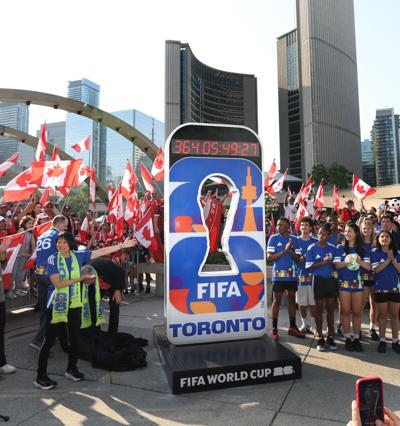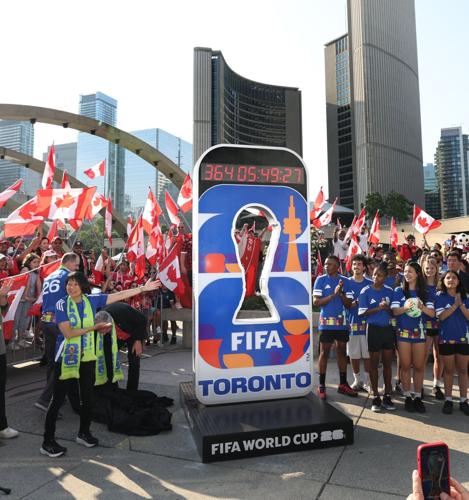The square outside city hall looked like a carnival on Thursday, as dignitaries and hundreds of soccer fans gathered in the sunshine to mark one year until ÎÚÑ»´«Ã½ will host its first game for the 2026 FIFA World Cup.Ìý
Kids played a pick-up game on a mini pitch, adults sporting jerseys of favourite teams from across the globe took selfies, and performers on stilts holding giant soccer balls walked among the crowd.Ìý
The high point arrived when Mayor Olivia Chow posed against a backdrop of waving Canadian flags and unveiled a giant clock that will count down the days until, as she put it, “We will... welcome the world to ÎÚÑ»´«Ã½ and proudly show our city.”Ìý
But for all the excitement the tournament is generating, with a year until kickoff there are still lingering questions about ÎÚÑ»´«Ã½’s ability to live up to expectations when global soccerdom descends upon it next June.
Thanks to a funding dispute with Premier Doug Ford’s government, chief among those questions is how the cash-poor municipality will pay to stage the six games it’s been allotted for the event, which is being co-hosted by 16 cities in Canada, the U.S. and Mexico.Ìý
The uncertainty around funding raises the prospect that ÎÚÑ»´«Ã½ will have to either pick up more of the tab for the games — meaning it would have millions less to spend on the city’s pressing, non-soccer-related priorities — or scale back on the event. If it does make cuts, programs intended to ensure the tournament gives a boost to local communities could be at risk.
‘Nothing is set is stone’
Sharon Bollenbach, executive director of ÎÚÑ»´«Ã½’s FIFA World Cup secretariat, said it’s not the city’s intent to scale back. In an interview, she said negotiations with the province are ongoing and she’s hopeful they’ll resolve without damaging the city’s plans. In the meantime, staff are doing everything possible to stage an event that will both deliver major benefits and stay within the council-approved $380-million budget.
“The world is going to be watching this city and we want to put our best foot forward,” she said.ÌýÌý
But Bollenbach acknowledged the city “wouldn’t be prudent” if it wasn’t looking for potential savings in its hosting costs. She said if it was forced to significantly reduce spending, it “would look at the things that aren’t necessarily core” to meeting the hosting requirements of FIFA, soccer’s global governing body. That could mean measures like limiting the number community celebrations funded by the city or rethinking how they’re staged.ÌýÌý
“Those are all things we’re exploring. Nothing is set in stone,” Bollenbach said.
The city has currently budgeted $1 million for a “community celebration fund” that would provide small grants to help local business and cultural organizations stage up to 50 World Cup events across ÎÚÑ»´«Ã½. One of the goals is to help spread the benefits of the tournament beyond the downtown area that will host the games at BMO Field, as well as the Fan Festival that will run throughout the tournament.Ìý
Scaling back on any local programming would be unfair,Ìýaccording to Coun. Parthi Kandavel (Ward 20, Scarborough Southwest). He said it’s vital that residents of suburban communities like his get a chance to participate in the tournament.
The first-term councillor said he’s always been skeptical of ÎÚÑ»´«Ã½’s decision to spend heavily on the World Cup when city hall lacks the money to adequately invest in areas such as transit, infrastructure and community recreation. But now that the event is going ahead “it’s important that communities … that are not in the core have some level of engagement, given the tremendous amount of tax dollars that are going towards supporting these six games,” he said.Ìý
City makes World Cup cuts
The city expects the World Cup will deliver broad benefits, including generating $393 million for ÎÚÑ»´«Ã½’s GDP, but some local elements have already been pared down. After FIFA amended its guidance, the city scrapped a planned training site at North York’s Sunnybrook Park and reduced the facility proposed for Etobicoke’s Centennial Park to a single field house and pitch. The change saved about $20 million, but prompted concerns from councillors that the community legacy promised by organizers was being watered down.
Chow said she would oppose reducing spending on any local celebrations, which she described as the “most precious” part of the tournament. She told reporters at an unrelated event Thursday that not everyone in the city can afford a ticket to the games and “it’s important that we engage the public.”
The mayor, who has been adamant that ÎÚÑ»´«Ã½ stay within the current budget, said she didn’t know where else the city could cut costs if it had to, but suggested provincial estimates for security spending could be lowered.
“We don’t know yet” where the city could find savings, Chow said. “We have to examine that.”
Yet the mayor and council have opened the door to deeper cuts to tournament spending. Last month theyÌýapproved a motion from Chow that reduced ÎÚÑ»´«Ã½’s World Cup budget, at least temporarily, by $40 million.Ìý
Chow’s office has accused Queen’s Park of trying to “claw back” the province’s funding pledge by that amount, and in a speech to council said her motion was necessary to “ensure we don’t spend money that we may not be able to get.” It capped the tournament budget at $340 million until the city can either secure more money from the other levels of government, or identify other sources of revenue or savings.
ÎÚÑ»´«Ã½ has agreed to shoulder almost half the cost of the city’s games, or about $180 million, while the provincial and federal governments have pledged $97 million and $104 million respectively. But the city’s disagreement with Queen’s Park centres on how Ontario’s share will be allocated.Ìý
Doug Ford makes demands
Ford’s government recently told the city that almost $40 million of its contribution would come in the form of increased spending on provincial services required for the tournament, such as health care, transportation, and policing, instead of cash. Because the value of any services will come out of the $97 million Ford has pledged, Ontario’s funding formula would leave ÎÚÑ»´«Ã½ with far less cash to stage the event than the city anticipated.Ìý
The province has also included services that some city hall officials say have little to do with staging a soccer tournament.ÌýMike Colle, the councillor for Eglinton-Lawrence and theÌýchair of Chow’s World Cup subcommittee, has criticized Ontario’s inclusion of funding for the “beautification” of provincial transit stations.
Colle also said Ford’s government initially wanted to count construction delays its Ontario Place redevelopment would incur during the World Cup as part of its hosting costs. The province valued the delays at more than $15 million. Colle said it was as if provincial ministries “threw in anything that they thought they could get away with.”
The Ontario Place item was left off a later version of the province’s service costs the city published. A spokesperson for the Ontario government didn’t directly answer questions about that issue, but said talks with the city are ongoing “to help ensure that this once-in-a-lifetime event is a success.”
Colle said the funding spat shouldn’t distract from what he is confident will be “an explosion” of enthusiasm when the tournament comes to town.
While he conceded the city could have to make some “adjustments” due to its funding crunch, he suggested private sponsors could pick up the bill for local celebrations. The city is already soliciting donations to create up to 12 mini soccer pitches throughout the city, which organizers are framing as one of the tournament’s major local legacies.
Uncertainty around ÎÚÑ»´«Ã½’s World Cup hosting plans is nothing new. How much it would cost has been unclear since ÎÚÑ»´«Ã½ agreed in 2018 to join the bid because, inÌýcontradiction of its own guidelines,Ìýit signed on without first securing funding commitments from the higher levels of government. The projected costs have also increased substantially from the initial city staff estimate of $45 million.Ìý
Exactly what the city has committed to do as host has also been murky. That’s because the contracts it signed with FIFA were secret. As previously reported, the Star obtained partly redacted copies through a freedom of information request, which showed ÎÚÑ»´«Ã½ had made commitments around advertising, public communications, transportation and other areas.Ìý
According to a confidentialÌý2022Ìýbusiness plan, the city was always unlikely to meet some of the obligations in the initial contracts. The report, prepared by a consultant firm and also obtained by the Star through an information request, listed four elements “ÎÚÑ»´«Ã½ may not entirely meet”: FIFA’s requests for the city to provide free public transit to attendees; to prohibit major construction “that could affect traffic or cause congestion during the competition”; to control the inventory of third-party billboards around tournament sites; and to limit taxes on tickets to 10 per cent.
City officials have publicly said the free transit provision has been scrapped, but have been tight-lipped on the status of other obligations, saying only that as planning has progressed “some requirements have been revised, removed or are being refined to align with local circumstances and realities.”Ìý






































To join the conversation set a first and last name in your user profile.
Sign in or register for free to join the Conversation